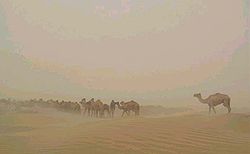Chakhansur District
Chakhansur
چکانسور دمگ ولسوالی چخانسور چخانسور ولسوالۍ | |
|---|---|
 | |
| Coordinates: 31°10′N 62°04′E / 31.167°N 62.067°E | |
| Country | |
| Province | Nimruz Province |
| Capital | Chakhansur |
| Population | |
| • Estimate (2004) | 11,165 |
| Time zone | + 4.30 |

Chakhansur (Balochi: چکانسور دمگ, Dari: ولسوالی چخانسور) is a district in the Nimruz Province of Afghanistan. It has a population of about 11,165 as of 2004, which includes Baloch that form the majority followed by Tajik, Pashtun ethnic groups.[1]
The economy is primarily based on agriculture, and the necessary water for irrigation is dependent on the status of the Sistan Basin, an endorheic basin which periodically becomes dry.
This area of Afghanistan was a major medieval cultural hub on the Silk Road but most ancient structures are now covered by sand. Signs of historical irrigation systems, including canals, are still visible in the Chakhansur area while elsewhere canals are filled with silt and agricultural fields buried by shifting sand. Today the area is relatively sparsely populated. There continue to be problems with water control and periodic flooding and drought.[2][3][4]
Ibrahim Khan Sanjrani Fort is located in this District.
In 2004 the Chakhansur farmers had been experiencing a severe and long term drought. Even with help from the World Food Program, many have abandoned their homes, perhaps as many as 20,000, to search for water and jobs.[5]
See also
[edit]Footnotes
[edit]- ^ "Chakhansor District" (PDF). Central Statistics Office Afghanistan. Afghanistan's Ministry of Rural Rehabilitation and Development. 2004. Archived from the original on December 22, 2015. Retrieved 2012-07-18.
{{cite web}}: CS1 maint: unfit URL (link) - ^ "Floods kill three, destroy 300 houses in western Afghanistan". Archived from the original on 2007-09-27. Retrieved 2007-07-31.
- ^ "History of Environmental Change in the Sistan Basin 1976 - 2005" (PDF). Archived from the original (PDF) on 2007-08-07. Retrieved 2007-07-20.
- ^ "Restoration, Protection and Sustainable Use of the Sistan Basin". Retrieved 2007-07-20.
- ^ Gall, Carlotta (2004-12-17). "Afghans dig in, but losing ground to 7-year drought - 37 percent of population can't meet basic needs". San Francisco Chronicle. Retrieved 2007-07-31.
External links
[edit]- Satellite view of Chakhansur
- Shows Chakhansur proximity to Sistan Basin
- Dust storm over Afghanistan and Pakistan
- From Wetland to Wasteland: The Destruction of the Hanoum Oasis


